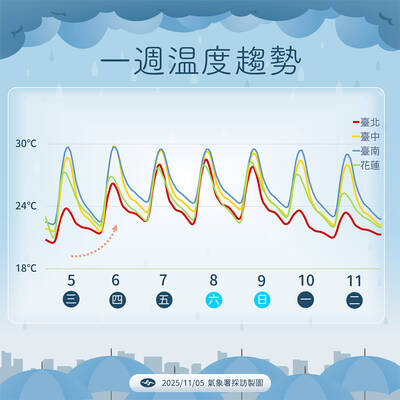A literary nod to a Taiwanese novelist has made waves from a small French island.
Ushant, off the coast of France, awarded its Island Fiction Prize — the Salon d’Ouessant’s International Island Literature Fiction Award for 2015 — to the French translation of a novel by Taiwanese writer Wu Ming-yi (吳明益), author of The Man With Compound Eyes (複眼人).
The novel, an eco-fantasy about the near future in Taiwan, was translated into French by Gwennael Gaffric after being commissioned by Stock, a Paris publishing firm.
According to Gray Tan (譚光磊), Wu’s literary agent in Taipei, the French award is another feather in Wu’s cap, following separate English translations published in Britain and the US.
Gaffric’s translation was published in France last year, titled L’homme aux Yeux a Facettes in French, Tan said.
When asked how sales of the French translation were doing, Gaffric said in an e-mail that he was not sure, since Stock does not release sales figures to the public.
However, he said the prize was both a surprise and a good thing for the book’s reception in France.
Ushant is a small French island off the coast of Brittany in France. While the population in the winter months is about 1,000, in the summer, the island comes alive with tourists arriving by ferry or plane, with a boat ride to Brest, France, taking about two hours.
Ten years ago, a literary group on the island began awarding prizes for novels, poetry, photography books and nonfiction about islands and island nations around the world.
When asked how he felt about the winning the French award, Wu said was honored and touched that the jury recognized his novel and Gaffric’s translation, adding: “I hope that someday all people who live on islands, large and small, will have a chance to hear the stories of other island dwellers.”

Three Taiwanese airlines have prohibited passengers from packing Bluetooth earbuds and their charger cases in checked luggage. EVA Air and Uni Air said that Bluetooth earbuds and charger cases are categorized as portable electronic devices, which should be switched off if they are placed in checked luggage based on international aviation safety regulations. They must not be in standby or sleep mode. However, as charging would continue when earbuds are placed in the charger cases, which would contravene international aviation regulations, their cases must be carried as hand luggage, they said. Tigerair Taiwan said that earbud charger cases are equipped

Foreign travelers entering Taiwan on a short layover via Taiwan Taoyuan International Airport are receiving NT$600 gift vouchers from yesterday, the Tourism Administration said, adding that it hopes the incentive would boost tourism consumption at the airport. The program, which allows travelers holding non-Taiwan passports who enter the country during a layover of up to 24 hours to claim a voucher, aims to promote attractions at the airport, the agency said in a statement on Friday. To participate, travelers must sign up on the campaign Web site, the agency said. They can then present their passport and boarding pass for their connecting international

UNILATERAL MOVES: Officials have raised concerns that Beijing could try to exert economic control over Kinmen in a key development plan next year The Civil Aviation Administration (CAA) yesterday said that China has so far failed to provide any information about a new airport expected to open next year that is less than 10km from a Taiwanese airport, raising flight safety concerns. Xiamen Xiangan International Airport is only about 3km at its closest point from the islands in Kinmen County — the scene of on-off fighting during the Cold War — and construction work can be seen and heard clearly from the Taiwan side. In a written statement sent to Reuters, the CAA said that airports close to each other need detailed advanced

UNKNOWN TRAJECTORY: The storm could move in four possible directions, with the fourth option considered the most threatening to Taiwan, meteorologist Lin De-en said A soon-to-be-formed tropical storm east of the Philippines could begin affecting Taiwan on Wednesday next week, the Central Weather Administration (CWA) said yesterday. The storm, to be named Fung-wong (鳳凰), is forecast to approach Taiwan on Tuesday next week and could begin affecting the weather in Taiwan on Wednesday, CWA forecaster Huang En-hung (黃恩鴻) said, adding that its impact might be amplified by the combined effect with the northeast monsoon. As of 2pm yesterday, the system’s center was 2,800km southeast of Oluanbi (鵝鑾鼻). It was moving northwest at 18kph. Meteorologist Lin De-en (林得恩) on Facebook yesterday wrote that the would-be storm is surrounded by